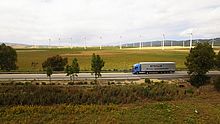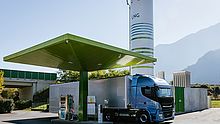Petrol and diesel are still the dominant transport fuels in Germany. Alternative and traditional biofuels currently account for just five percent of fuel consumption. The declared objective in Germany and Europe is to achieve greater use of alternative and renewable energy sources and to reduce fuel consumption and emissions. Transport sector consumption of final energy in the Federal Republic of Germany amounts to 2,629 petajoules or roughly 30 percent of total consumption.
dena is a vocal advocate for the use of alternative energy sources in road transport, campaigning for innovative forms of drives and fuels. After all, a sustainable decarbonisation in the transport sector requires a paradigm shift and decisive action, starting today. So far, there has been little progress in reducing CO2emissions in the transport sector. In 2015, emissions returned to the same level as 1990, despite improvements in energy efficiency. Energy consumption is rising, not falling. Mediating between politics and industry, dena is calling for change through the introduction of clear measures and strategies.
Battery or hydrogen-powered electromobility
It is the declared goal of the Federal Government that one million electric vehicles should travel Germany’s roads by 2020. But there is a lot to do: of the 3.2 million new vehicles licensed in 2015, a paltry 33,000 had a hybrid engine, and just 12,500 were exclusively powered by electricity. This although the benefits of e-mobility are evident: quiet and virtually emission-free when used in local settings, the vehicles offer efficiency of up to 90 percent and are therefore particularly effective ways to save energy. Hydrogen-powered vehicles with fuel cells are an option in addition to so-called BEV (Battery Electric Vehicles) with chemical battery storage. At the moment, hydrocarbons (mainly natural gas) are used to produce hydrogen, and the process involves high energy consumption. Nevertheless, there are auspicious new ways of increasingly producing hydrogen using renewable energy sources (see Power to Gas). But electromobility is still not suitable for all areas of use, and therefore the mass market. Vehicles running on battery storage will require less expensive battery packs with a greater energy density and improved charging capabilities. Hydrogen vehicles will also see technical improvements in the years ahead, for instance in the area of fuel cells, and the infrastructural density must be increased gradually to reach consumer-friendly levels.
A consistent political strategy is imperative if alternative fuels are to become mainstays in a more sustainable mobility concept in coming years. This strategy must be open to new technologies, promoting low-emission fuels in particular and offering a long-term perspective for more investment in innovative drive concepts. The industrial sector and the Federal Government must also ramp up their investments significantly to raise awareness among consumers and to market more sustainable vehicles.
dena supports this process in its role as an independent advisor to corporate and political sectors. Its aim is to implement a sustainable and efficient energy transition – also to act as a paragon for other countries.




